Unlocking Social Media Success with Powerful Reporting Tools
Social media success requires more than just posting content. You need data-driven insights to understand your audience, refine your strategy, and achieve meaningful results. This is where social media reporting tools become essential. They provide the analytics you need to make informed decisions and optimize your approach.
This listicle explores 12 top social media reporting tools for 2025. We'll cover their key features, pricing, integrations, pros, cons, and ideal use cases. This guide helps you select the right tool to elevate your social media performance, whether you're an experienced marketer or just starting out.
We'll dive deep into tools like:
- Postiz
- Hootsuite
- Sprout Social
- Buffer
- Brandwatch
- Mention
- Lately
- Heyday
- Canva Pro
- ContentStudio
- Sendible
- StoryChief
Each tool review is based on extensive, real-world usage. You'll gain practical insights, understand limitations, and discover which tool best fits your specific needs. Let's find the perfect social media reporting tool for you.
1. Postiz
Postiz stands out among social media reporting tools by combining scheduling, AI content creation, and robust analytics. It's a powerful open-source platform ideal for teams and privacy-conscious users. Its Canva-like interface simplifies content creation, while automated features like auto-posting and auto-commenting boost engagement. A key strength is its self-hosting option, providing complete control over your data.
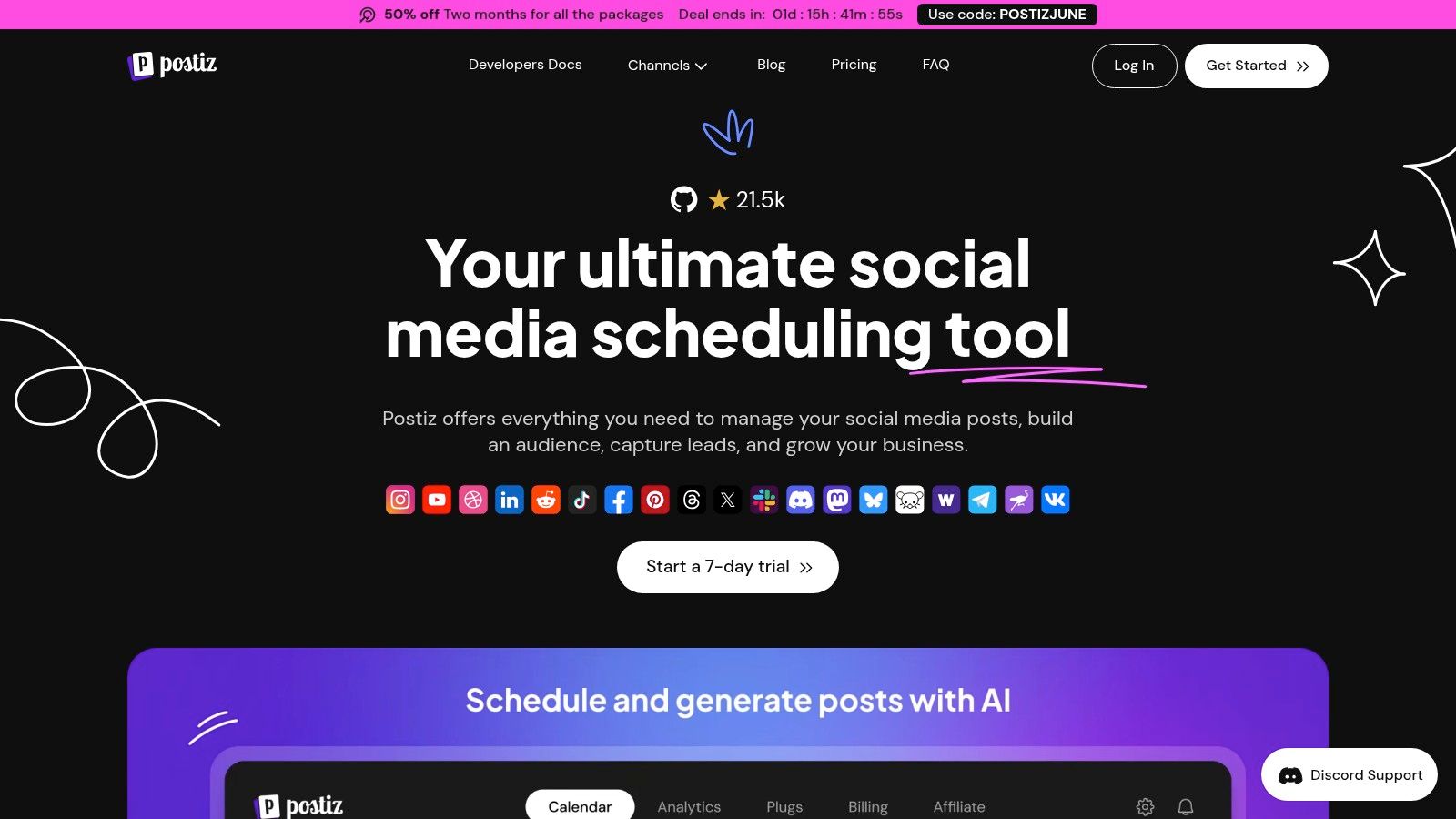
Postiz streamlines social media management by supporting various platforms and offering cross-posting. This eliminates manual posting on individual channels. Comprehensive analytics dashboards provide insights into post performance, enabling data-driven strategy adjustments. Its collaboration features, including role assignments and task delegation, make it suitable for marketing teams and agencies.
Pros and Cons
Pros:
- AI-powered content ideation and image generation
- Robust collaboration tools for teams
- Automated engagement features (auto-post, auto-like, auto-comment)
- Self-hosting option for data control
- Cross-posting across multiple platforms
Cons:
- Self-hosting setup requires technical expertise
- Advanced features may have a learning curve
Postiz offers a 7-day free trial and a limited-time 50% discount. This makes it an affordable option for enhancing your social media presence. Its open-source nature, combined with comprehensive features, makes Postiz a strong contender among social media reporting tools. Check out their website for more information: https://postiz.com
2. Hootsuite
Hootsuite is a versatile social media management platform ideal for streamlining workflows. It allows users to schedule posts, monitor social media activity, and analyze performance across multiple networks from a single dashboard. This makes it a powerful tool for social media reporting, enabling data-driven decision-making. Its user-friendly interface simplifies complex tasks, while its extensive integrations enhance its functionality.
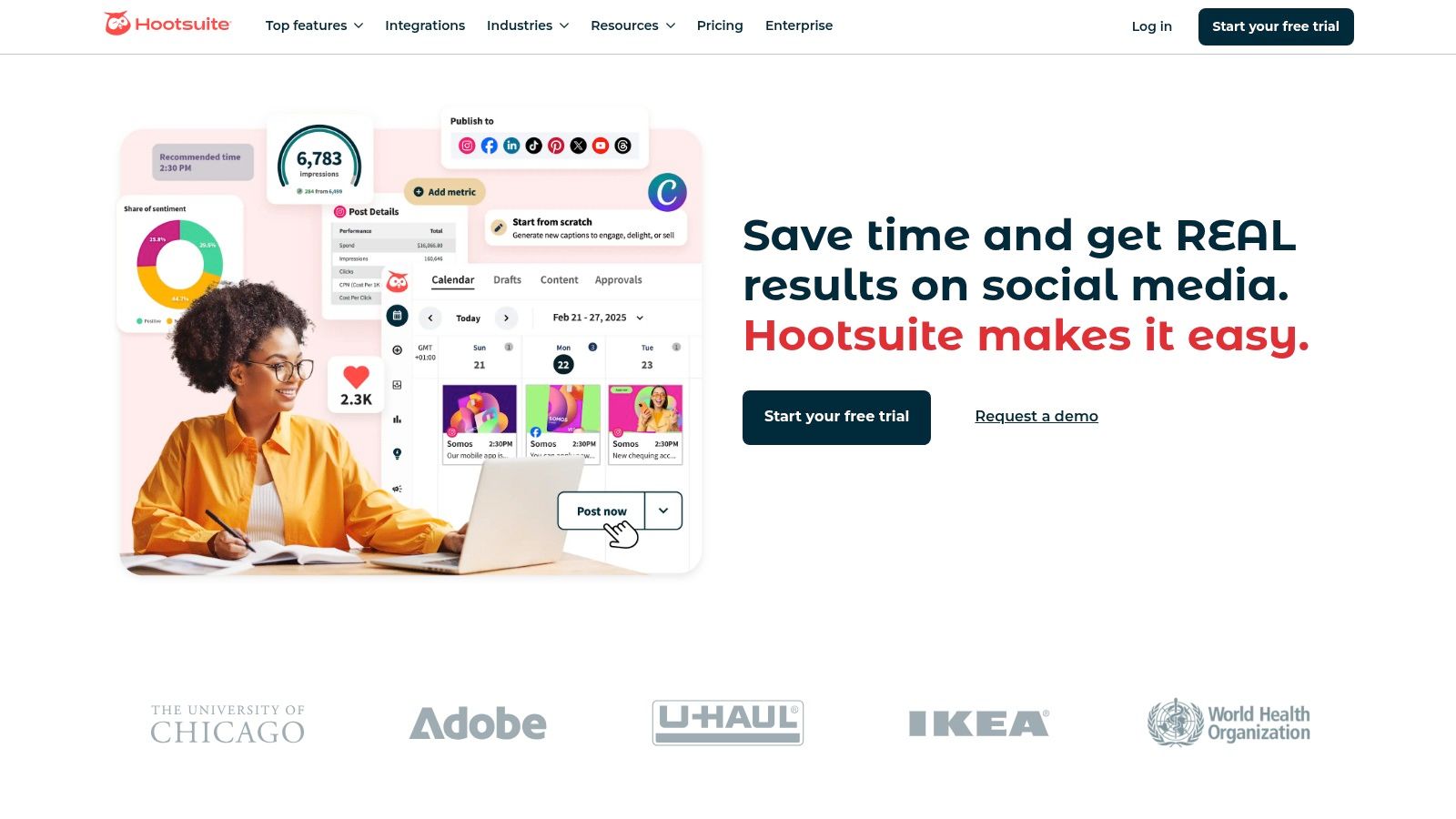
Hootsuite's key strength lies in its comprehensive feature set. From scheduling and publishing across various platforms to in-depth analytics and social listening, it offers a centralized hub for managing your social media presence. Its team collaboration tools facilitate workflow management, assigning tasks, and approving content within the platform. For a deeper dive into automation, learn more about Hootsuite and other similar platforms. The platform also integrates with over 100 apps, including Canva and Slack, further extending its capabilities.
Pros and Cons
Pros:
- Comprehensive feature set for managing multiple social media accounts.
- User-friendly interface simplifies complex tasks.
- Extensive integration options with other popular tools.
- Robust analytics and reporting features.
Cons:
- Can be more expensive than other social media reporting tools.
- Beginners may face a steeper learning curve to utilize all features effectively.
Hootsuite offers various pricing plans to cater to different needs and budgets. Its comprehensive features and integrations make it a worthwhile investment for businesses and individuals looking to enhance their social media presence and reporting capabilities. Visit their website for more information: https://hootsuite.com/
3. Sprout Social
Sprout Social stands out as a robust social media management platform geared towards businesses seeking to elevate their online presence. Its suite of tools covers scheduling, monitoring, and analytics, making it a comprehensive solution. Sprout Social is particularly valuable for businesses that prioritize social listening and customer relationship management (CRM) within their social media strategy. Its unified inbox streamlines communication across multiple platforms.
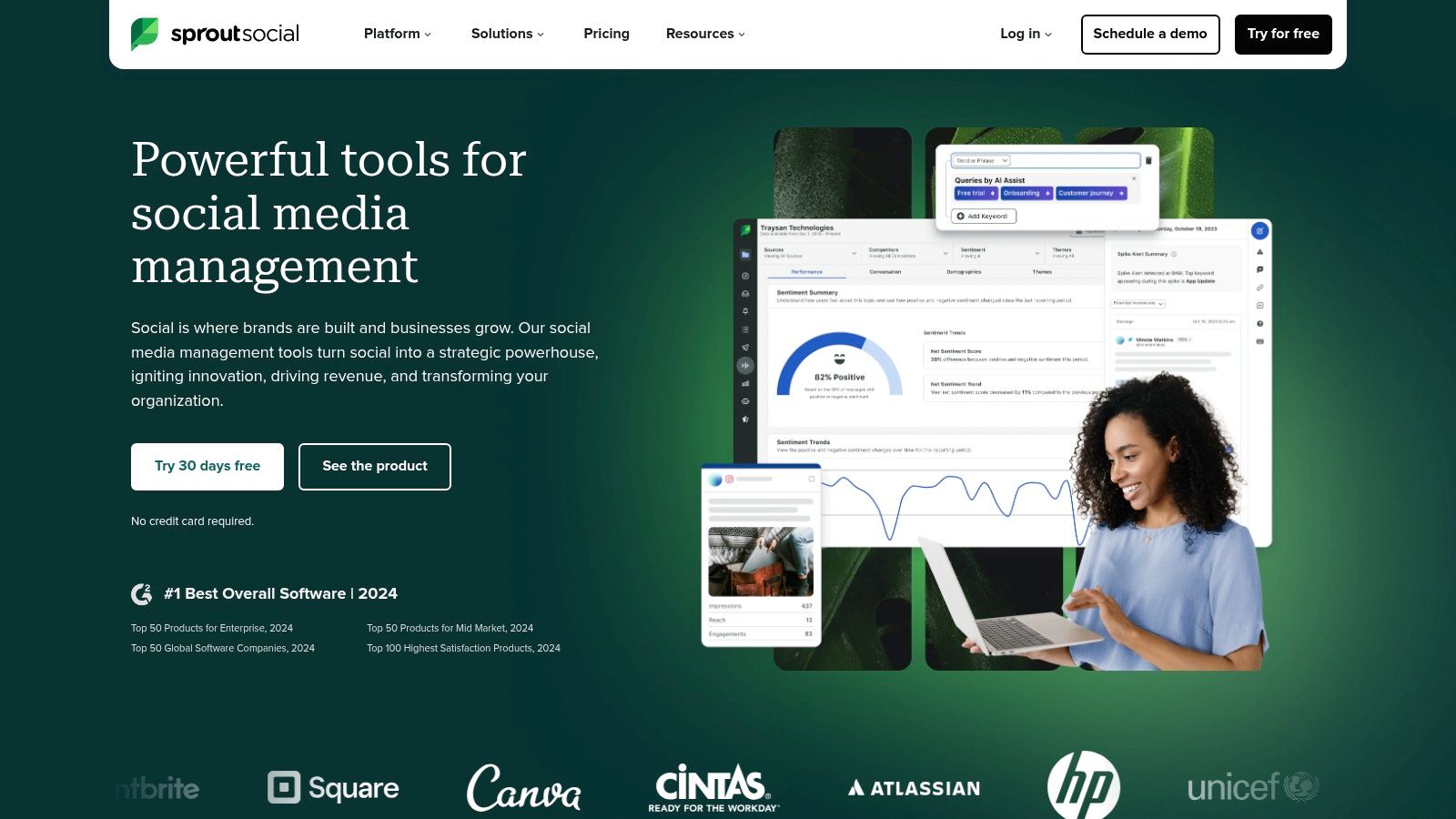
Sprout Social's strength lies in its intuitive interface and detailed analytics. The platform's reporting capabilities provide in-depth insights into post performance, audience demographics, and engagement trends. This data empowers users to refine their social media strategies and demonstrate ROI. Furthermore, its content calendar and scheduling tools simplify content planning and ensure consistent posting.
Pros and Cons
Pros:
- Intuitive user interface simplifies navigation and task management.
- Comprehensive analytics provide valuable insights for data-driven decisions.
- Strong customer support ensures prompt assistance when needed.
Cons:
- Premium pricing may be a barrier for smaller businesses or individuals.
- Limited integrations compared to some competitors restrict extensibility.
Sprout Social offers a free trial to explore its features. For pricing details, visit their website: https://sproutsocial.com/ Its comprehensive features and intuitive interface make it a powerful social media reporting tool, particularly for businesses focused on social listening and CRM.
4. Buffer
Buffer simplifies social media management by focusing on scheduling, publishing, and basic analytics. It's a streamlined tool ideal for small to medium-sized businesses seeking an intuitive platform. Its clean interface makes scheduling posts across various platforms straightforward, even for beginners. A key strength is its browser extension, allowing for quick content sharing from anywhere on the web.
Buffer streamlines workflows with its mobile app, enabling on-the-go post management. This flexibility is invaluable for users needing to maintain their social presence while away from their desktops. Basic analytics dashboards provide an overview of post performance, offering insights into engagement and reach. Its team collaboration features simplify workflow management within small teams.
Pros and Cons
Pros:
- Affordable pricing plans
- Simple and user-friendly interface
- Supports multiple social media networks
- Convenient browser extension and mobile app
Cons:
- Lacks advanced analytics and reporting features
- Doesn't offer social listening capabilities
Buffer's affordable pricing makes it accessible to businesses with limited budgets. Its simplicity, combined with essential features, positions Buffer as a valuable social media reporting tool for those prioritizing efficient scheduling and publishing. Check out their website for more information: https://buffer.com/
5. Brandwatch
Brandwatch excels as a social media reporting tool by offering in-depth analytics for understanding brand perception, audience behavior, and market trends. Its comprehensive social listening capabilities capture vast amounts of data, providing valuable insights beyond basic metrics. This makes it ideal for brands focused on strategic decision-making based on deep consumer understanding.
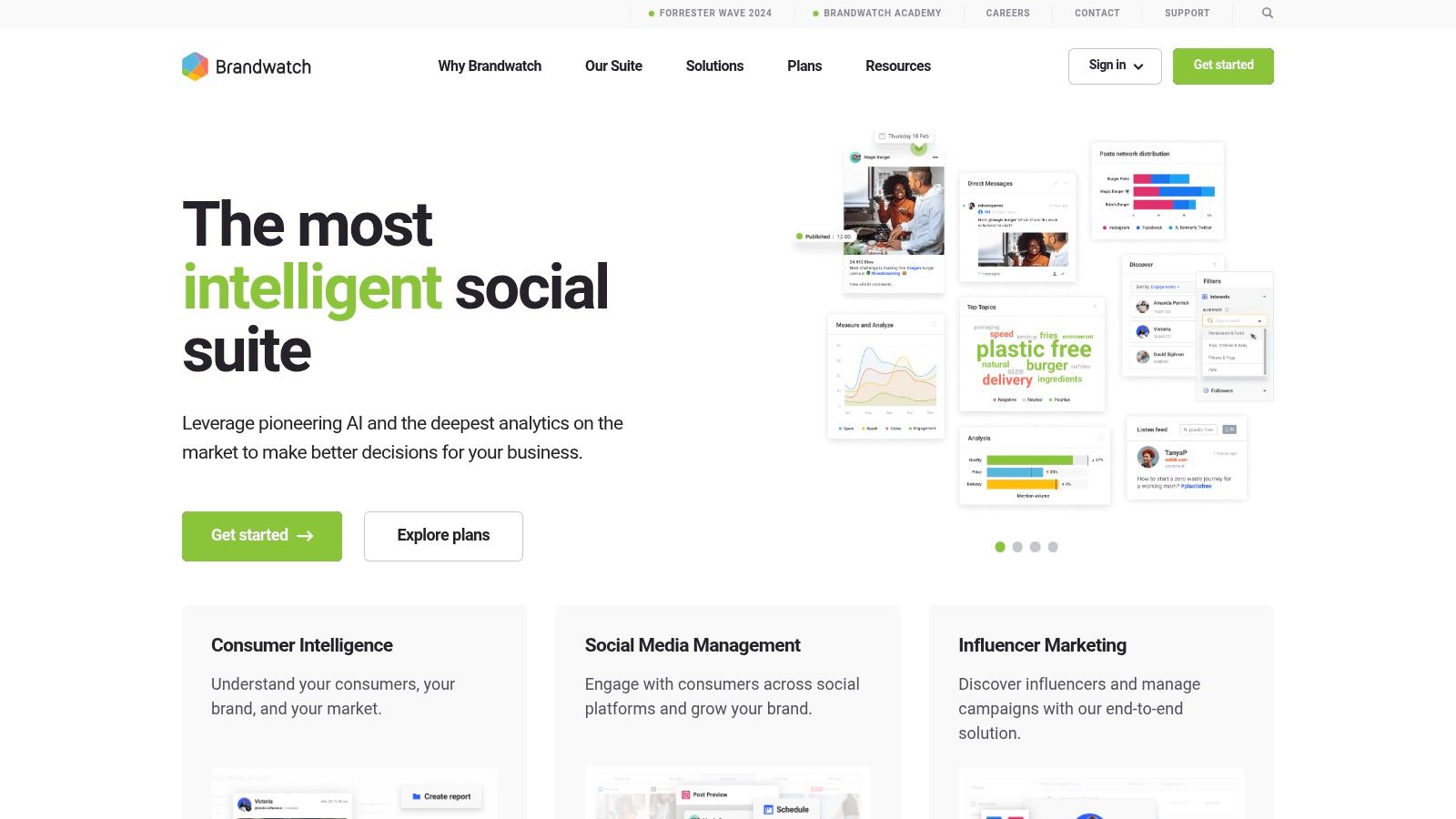
Brandwatch's customizable dashboards allow you to track key metrics and visualize data in a way that suits your specific needs. Features like sentiment analysis and competitive benchmarking offer a nuanced understanding of your brand's position in the market. This data-driven approach empowers you to refine your social media strategies and maximize impact. Its influencer identification feature is a powerful tool for outreach and collaboration.
Pros and Cons
Pros:
- In-depth analytics and extensive data coverage
- Highly customizable reports and dashboards
- Powerful sentiment analysis and competitive benchmarking
Cons:
- High cost may be prohibitive for smaller businesses
- Complex setup and a steep learning curve can be challenging for beginners
Brandwatch is a premium social media reporting tool suited for businesses that require advanced analytics and extensive data coverage. Check out their website for more information: https://www.brandwatch.com/
6. Mention
Mention excels as a real-time social media reporting tool by offering comprehensive brand monitoring across diverse platforms. It tracks mentions on social media, blogs, forums, and news sites, providing valuable insights into online conversations. This allows businesses to stay informed about their brand reputation and identify potential crises or opportunities. Its user-friendly interface makes it easy to set up tracking keywords and receive instant alerts.
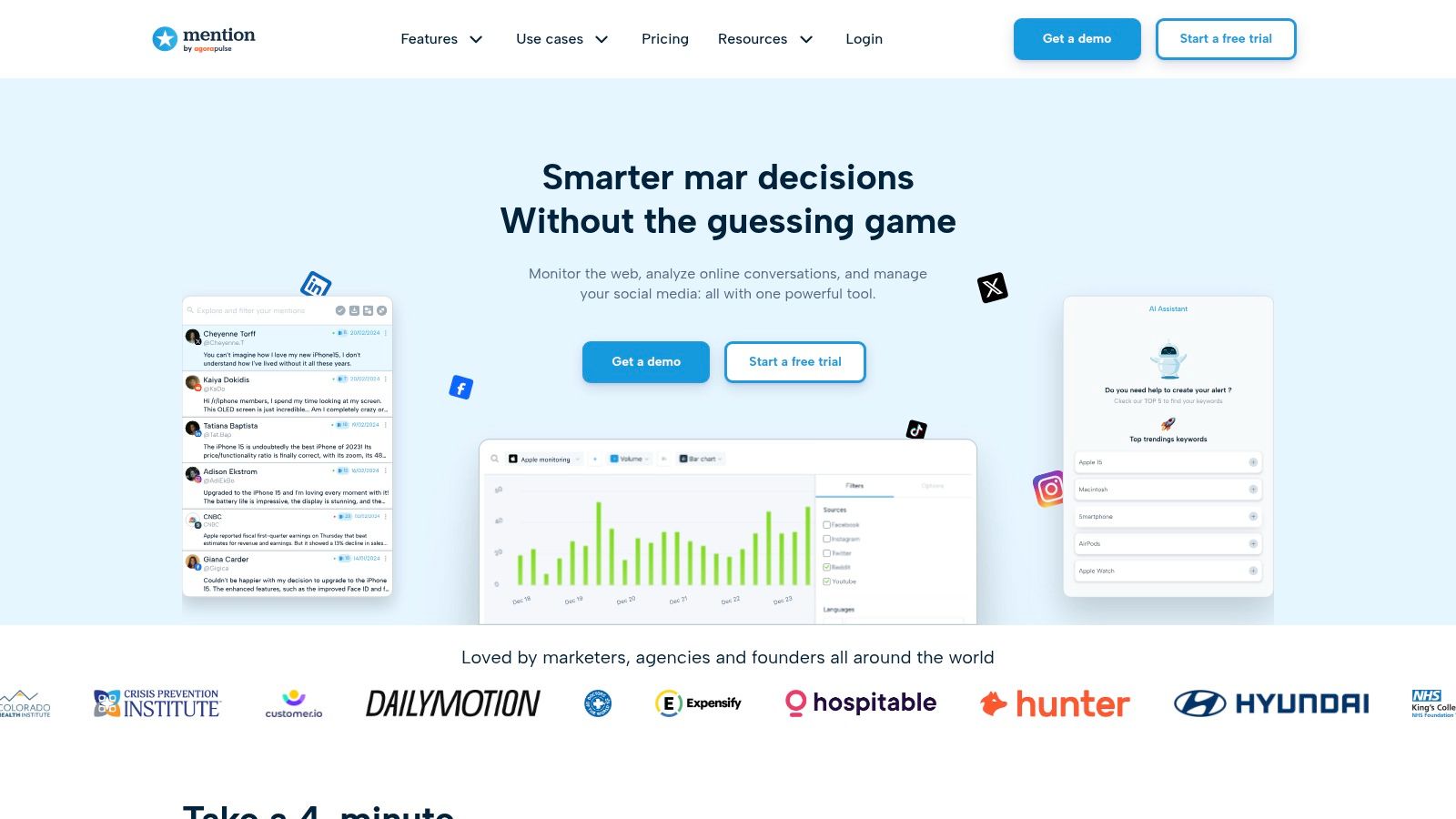
Mention's real-time monitoring is its core strength, enabling quick responses to online discussions. The sentiment analysis feature helps gauge public opinion towards your brand. Competitive analysis provides insights into competitor activities and industry trends. Automated reports streamline reporting processes, saving valuable time. Influencer identification features help discover relevant influencers for collaborations.
Pros and Cons
Pros:
- User-friendly interface for easy setup and navigation
- Comprehensive coverage across various online platforms
- Affordable pricing plans suitable for businesses of all sizes
Cons:
- Limited historical data access for in-depth analysis
- Basic analytics features compared to more advanced competitors
Mention offers a free trial and various pricing plans to suit different needs. Its real-time monitoring and user-friendly interface make it a valuable social media reporting tool, especially for businesses focused on immediate response and reputation management. Check out their website for more information: https://mention.com/
7. Lately
Lately distinguishes itself among social media reporting tools with its AI-powered content generation capabilities. It repurposes your existing long-form content (blogs, podcasts, videos) into engaging social media posts. This streamlines content creation, saving you time and ensuring a consistent brand voice across platforms. Lately's user-friendly interface makes it easy to manage multiple accounts and schedule posts in advance. Want to optimize your marketing workflow further? Learn more about streamlining your process.
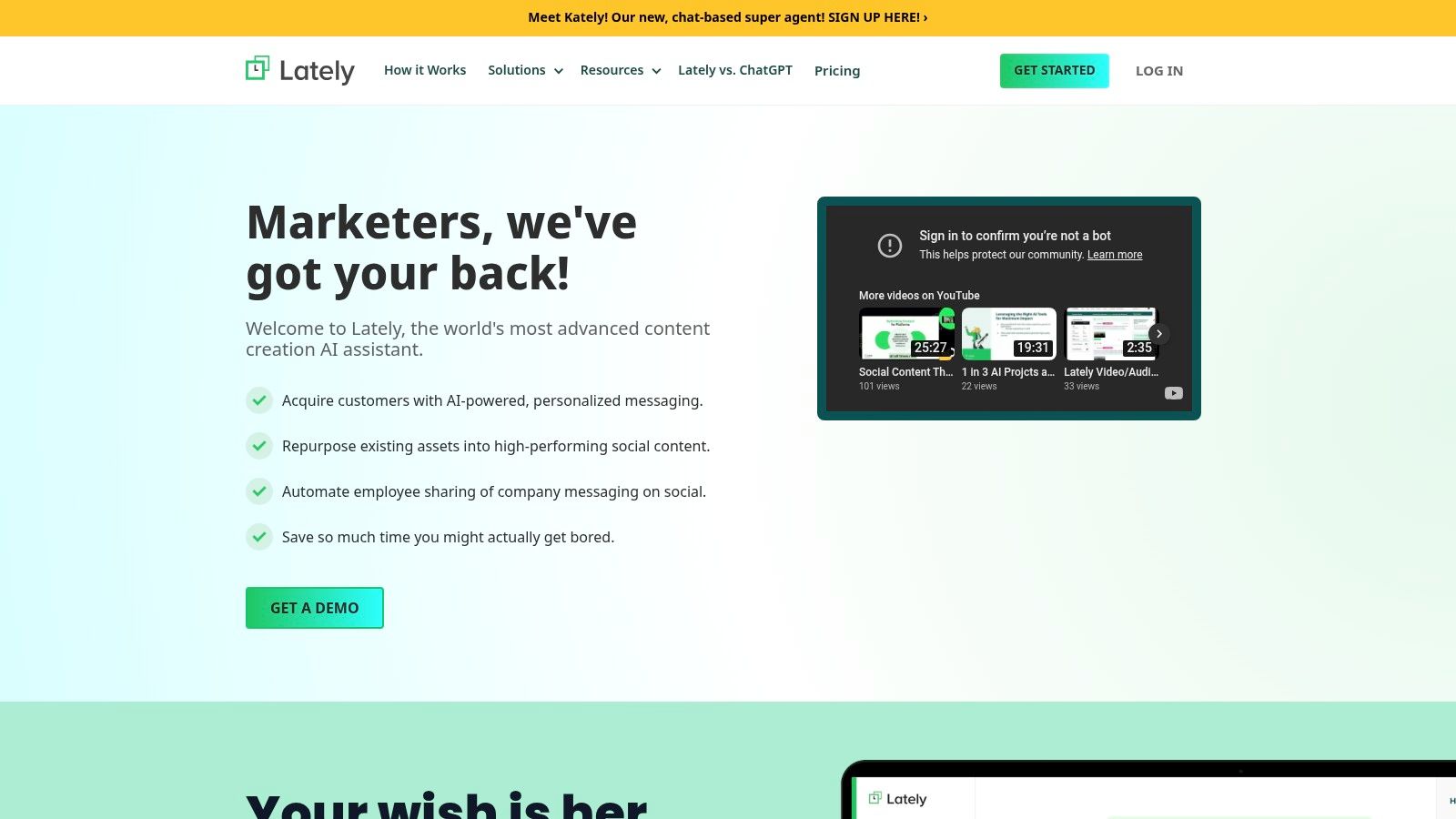
Beyond content creation, Lately provides analytics and reporting features to track post performance and audience engagement. It also offers content optimization suggestions based on AI analysis. Team collaboration tools facilitate workflow management for marketing teams. Lately helps maintain a consistent posting schedule and maximize the reach of your existing content. This makes it a valuable tool for content creators and social media managers looking to boost efficiency.
Pros and Cons
Pros:
- Time-saving content creation through repurposing
- Consistent brand voice across platforms
- User-friendly interface for easy management
Cons:
- Limited customization of AI-generated content
- Higher pricing for advanced features
Lately offers various pricing tiers based on your needs. Check their website for the most up-to-date information: https://www.lately.ai/
8. Heyday
Heyday distinguishes itself among social media reporting tools by focusing on AI-powered customer conversations. It integrates with social media channels like Facebook Messenger and Instagram to automate and personalize customer interactions. This enhances both engagement and support efficiency. It's particularly valuable for businesses prioritizing customer service and sales through social media.
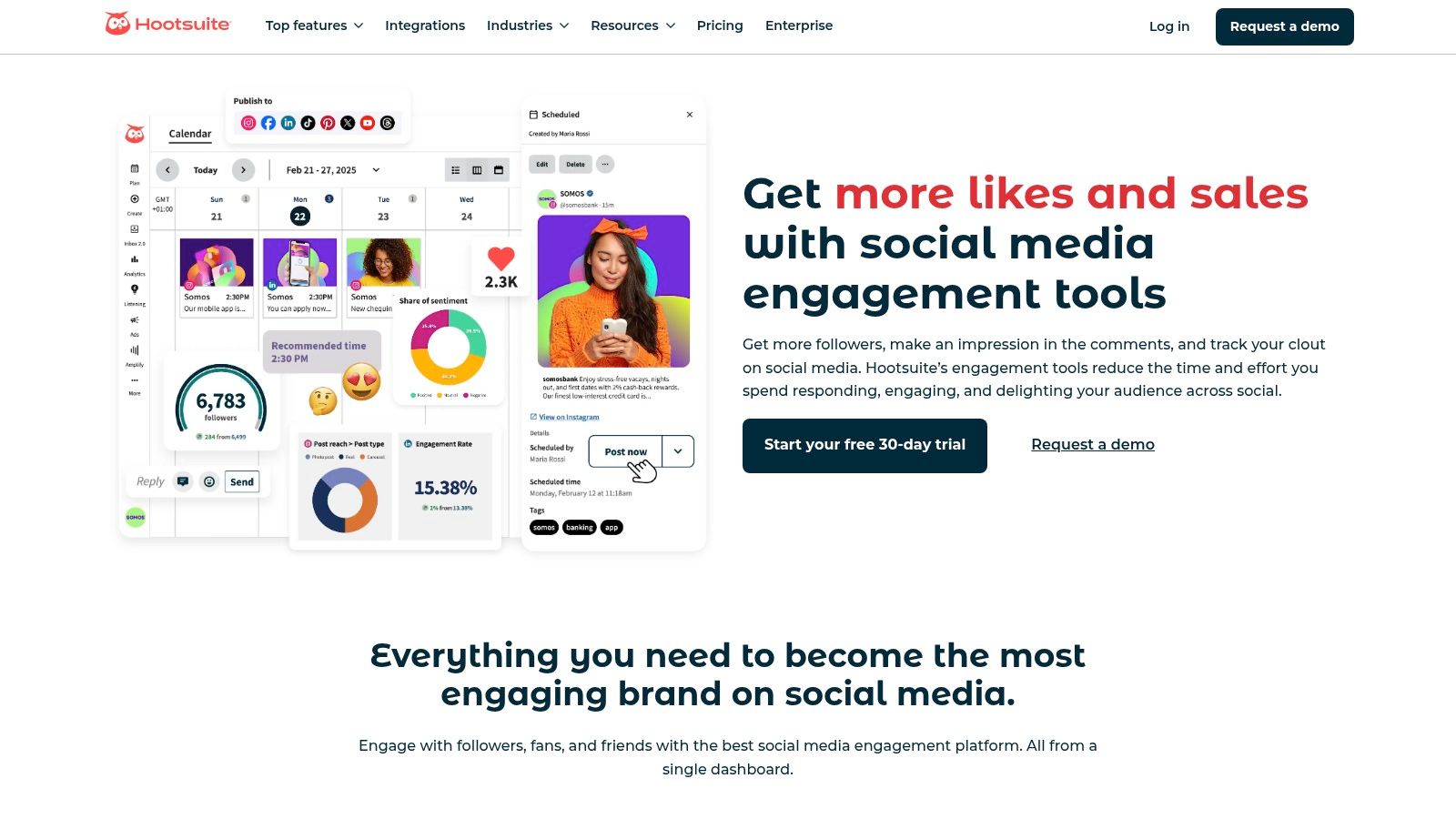
Heyday streamlines social media customer management by providing AI chatbots for automated responses. This frees up human agents to handle complex inquiries. The platform collects customer data, offering insights into frequently asked questions and customer behavior. This data-driven approach enables businesses to tailor their social media strategies for better customer experiences. Its multilingual support further broadens its reach.
Pros and Cons
Pros:
- Improves customer response times significantly
- Enhances customer experience through personalized interactions
- Easily integrates with existing social media platforms and e-commerce systems
Cons:
- Customization of chatbot responses might be somewhat limited
- Pricing could be a barrier for smaller businesses
Heyday offers a variety of pricing plans based on business needs. Contact their sales team for specific pricing details. For businesses looking to elevate their social media customer service and sales, Heyday is a valuable tool worth considering. Check out their website for more information: https://www.heyday.ai/
9. Canva Pro
Canva Pro simplifies social media management for visually-driven brands. It combines design tools with a content calendar, allowing users to create and schedule engaging posts directly within the platform. Its extensive template library and drag-and-drop interface make content creation accessible even for non-designers. This makes it ideal for small businesses and solopreneurs looking to elevate their visual presence.
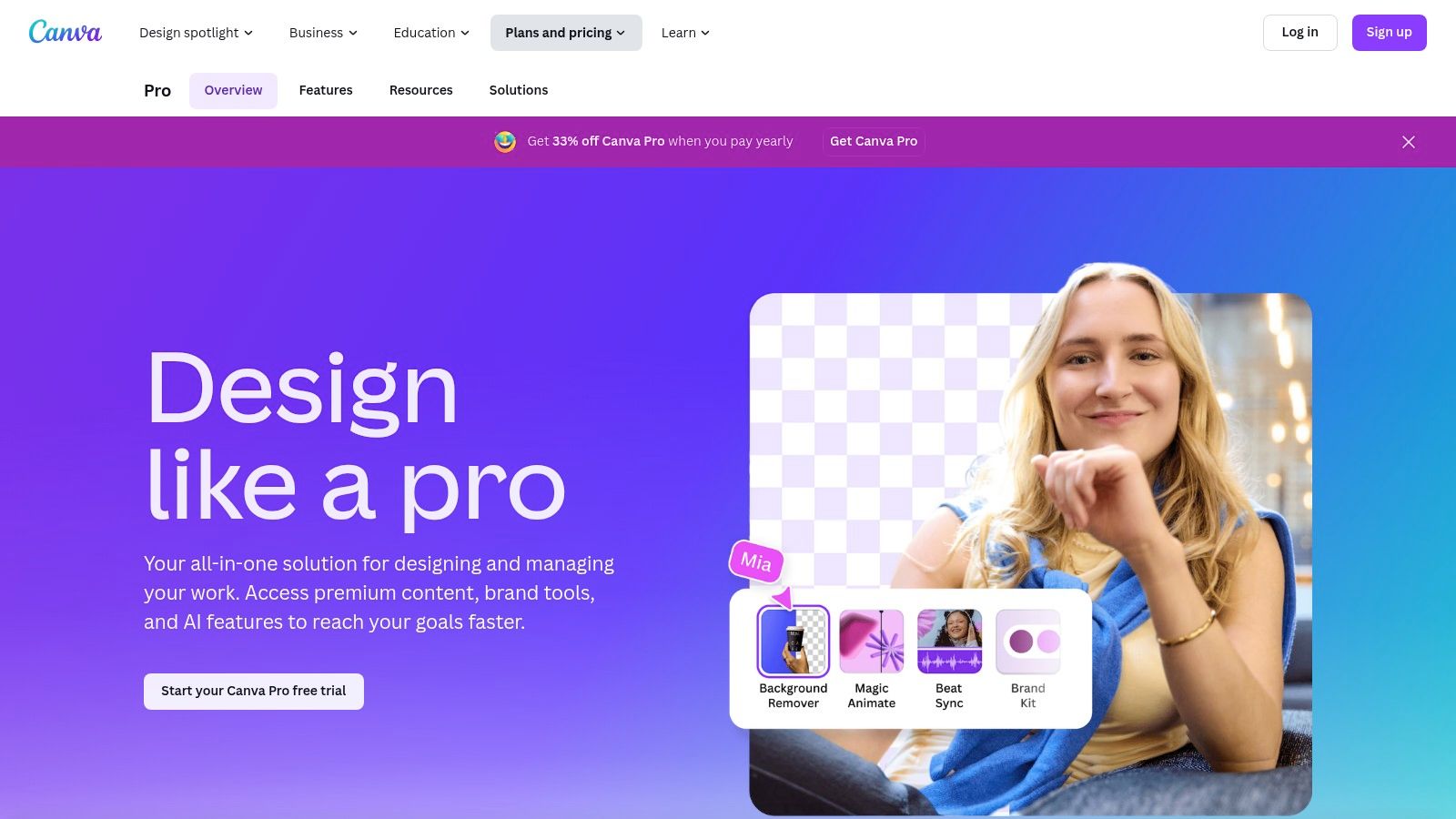
Canva Pro streamlines workflows by allowing direct publishing to various social media platforms. The Brand Kit feature ensures consistent branding across all channels. While primarily a design tool, its integrated content calendar provides basic scheduling functionality. However, it lacks the advanced analytics and reporting features found in dedicated social media management tools. Teams can leverage Canva Pro's collaboration tools to streamline content creation and approval processes.
Pros and Cons
Pros:
- User-friendly design interface for creating visually appealing content
- Affordable pricing plans suitable for small businesses and individuals
- All-in-one platform for design, scheduling, and publishing
- Brand Kit for maintaining consistent brand identity
Cons:
- Limited analytics capabilities for in-depth performance tracking
- Fewer integrations with other marketing tools compared to dedicated social media management platforms
Canva Pro offers a free trial and various paid plans based on team size and feature requirements. Check out their website for more information: https://www.canva.com/pro/
10. ContentStudio
ContentStudio distinguishes itself among social media reporting tools by offering a comprehensive platform for content discovery, planning, publishing, and analytics. It's particularly well-suited for teams and agencies needing to manage multiple social media accounts and content calendars. Its intuitive interface simplifies content creation and scheduling, while built-in analytics provide valuable performance insights. A key advantage is its affordability, especially for smaller teams looking for robust features without a hefty price tag. Learn more about creating effective social media calendars by exploring different examples: Learn more about effective social media calendars.
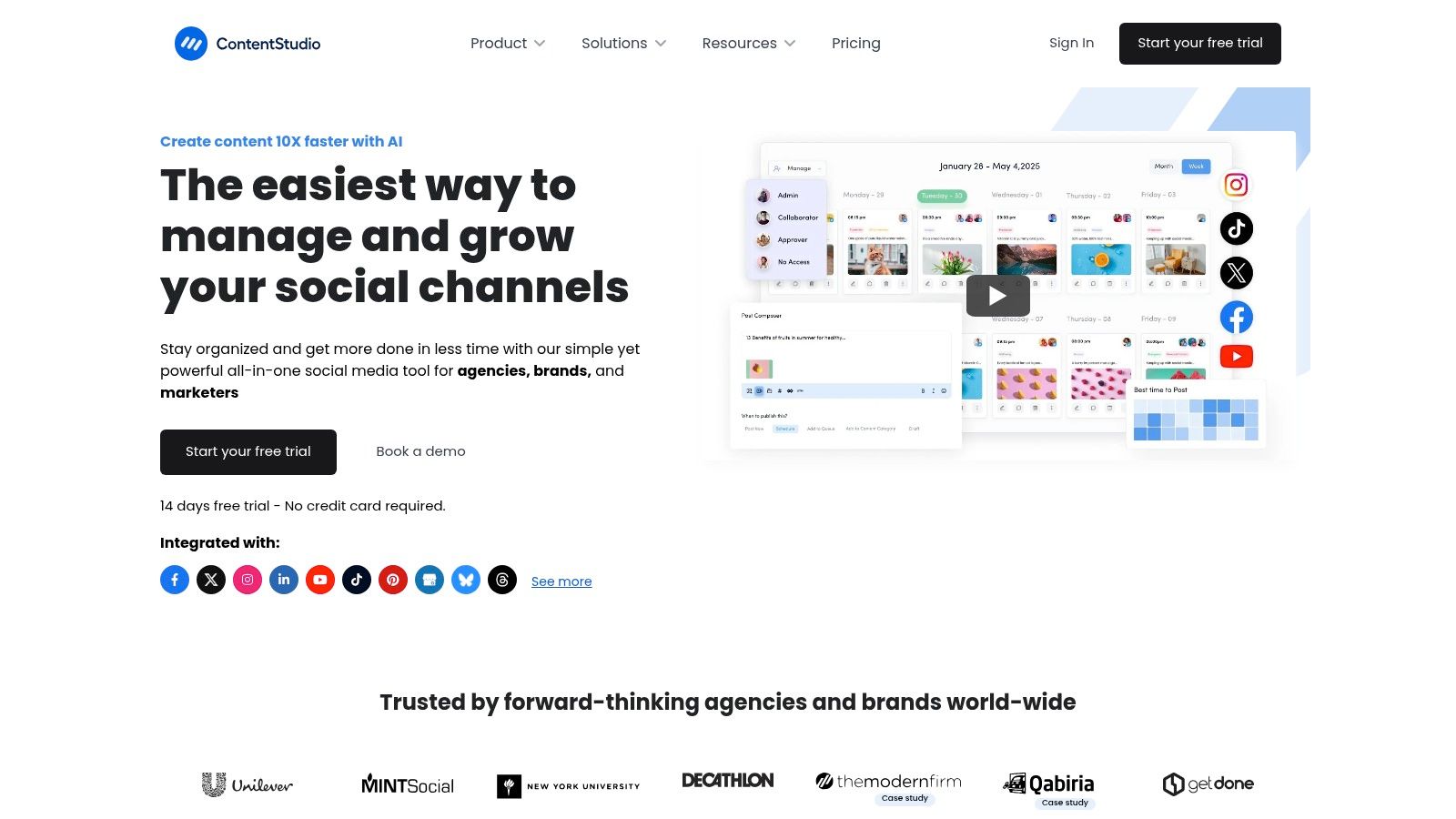
ContentStudio streamlines social media management by supporting various platforms and offering flexible scheduling options. This eliminates the need for manual posting across individual channels. Comprehensive analytics dashboards track key metrics like engagement and reach, enabling data-driven adjustments to content strategy. Collaboration features, including approval workflows and team assignments, facilitate efficient teamwork.
Pros and Cons
Pros:
- Comprehensive content management capabilities
- Support for multiple content formats (articles, images, videos)
- Affordable pricing plans for small teams
Cons:
- Limited integrations compared to some competitors
- Can have a learning curve for new users
ContentStudio offers a free trial and tiered pricing plans. This makes it an accessible option for businesses and individuals looking to streamline their social media presence. Its combination of content management, scheduling, and analytics makes ContentStudio a valuable tool for enhancing social media strategies. Check out their website for more information: https://contentstudio.io/
11. Sendible
Sendible distinguishes itself among social media reporting tools as an agency-focused platform. It offers robust features for scheduling, monitoring, and reporting across multiple client accounts. Its strength lies in streamlining client management and providing customizable reports tailored to individual client needs. This makes it ideal for agencies juggling numerous social media profiles.
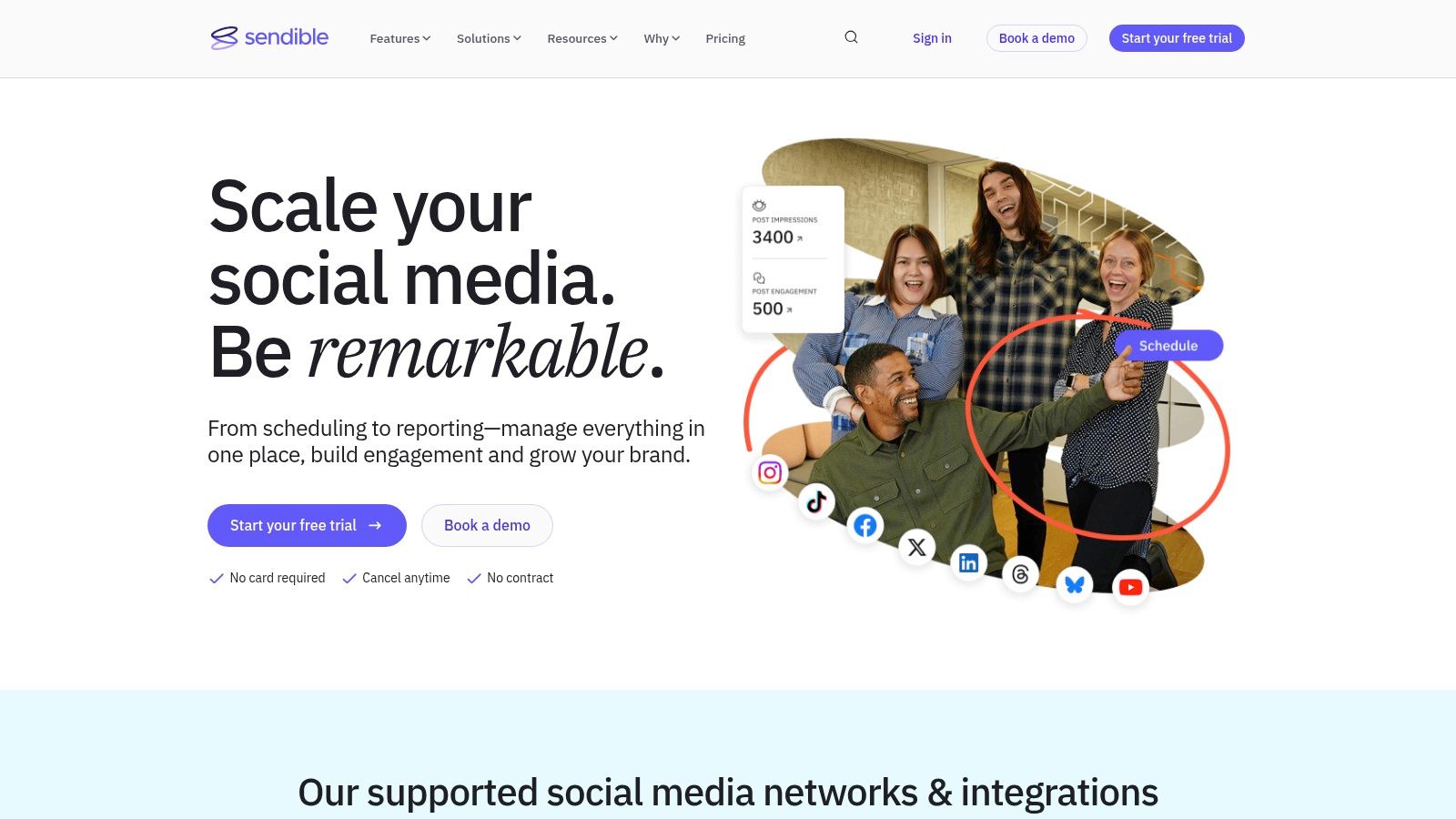
Sendible's content calendar and scheduling features simplify content organization and automated posting. Social listening tools enable agencies to track brand mentions and industry trends. The white-label solution further enhances its agency appeal, allowing for branded reports and dashboards. This strengthens client relationships and reinforces agency professionalism. Sendible supports a wide array of social media platforms, covering most client needs.
Pros and Cons
Pros:
- Designed specifically for agencies managing multiple clients
- Comprehensive and customizable reporting tools
- Effective social listening and monitoring capabilities
- White-label solutions for enhanced branding
Cons:
- Higher pricing tiers may be less accessible for smaller businesses
- The interface can feel overwhelming for new users due to its extensive features
Sendible offers a free trial and tiered pricing plans to cater to varying agency sizes. Its focus on client management and reporting makes it a valuable social media reporting tool for agencies seeking to streamline their workflows and deliver professional results. Check out their website for more information: https://www.sendible.com/
12. StoryChief
StoryChief excels as a content marketing platform, empowering teams to collaborate, publish across various channels, and analyze performance. It streamlines the entire content workflow, from ideation to distribution. Its collaborative editor simplifies content creation and review processes, fostering seamless teamwork. StoryChief's multi-channel publishing feature allows for efficient content distribution across websites, blogs, and social media platforms.
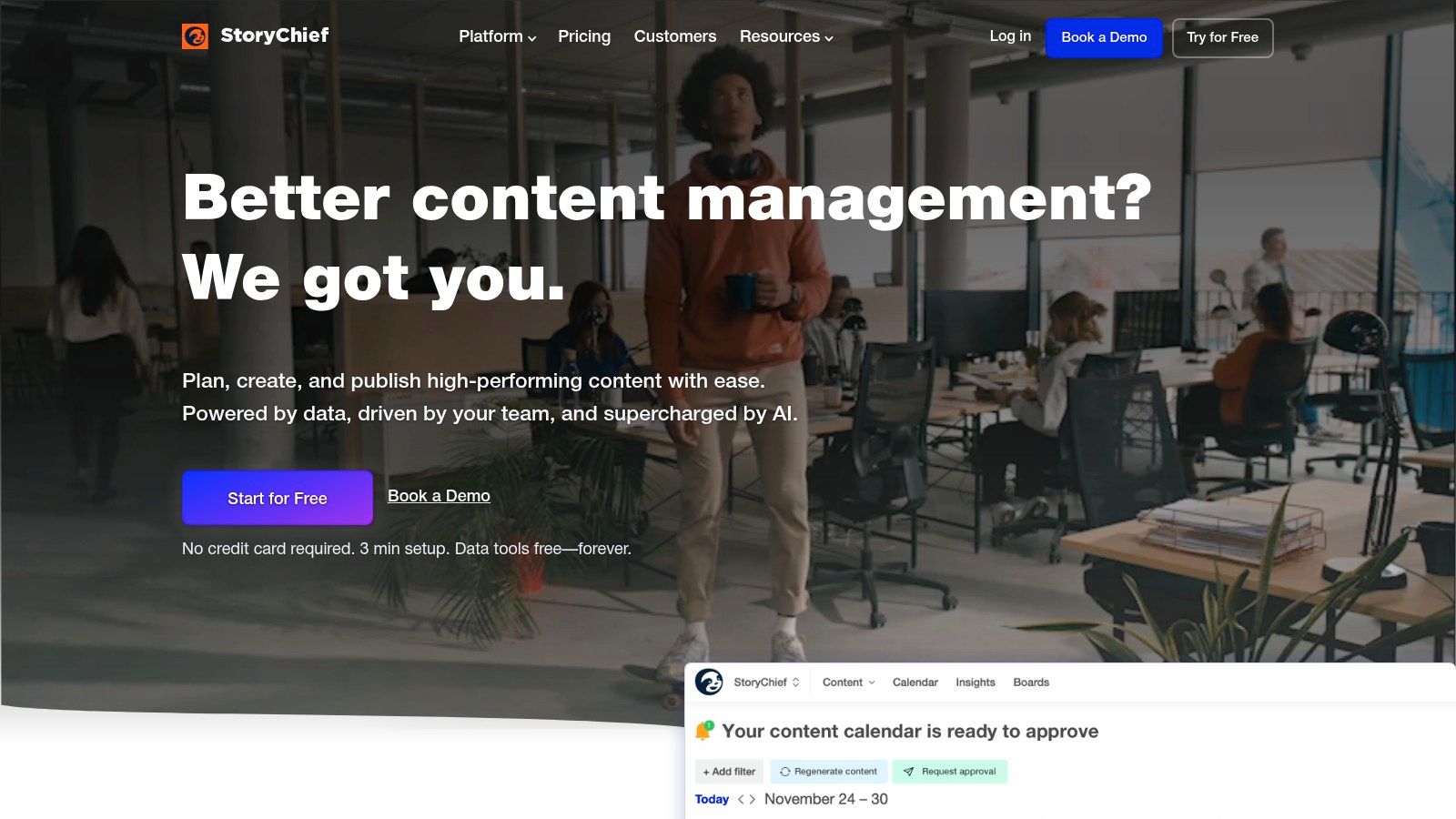
StoryChief offers robust SEO optimization tools to improve content visibility and organic reach. The platform's built-in content calendar facilitates scheduling and planning, ensuring consistent publishing. Performance analytics provide valuable insights into content engagement and campaign effectiveness, enabling data-driven adjustments. Although StoryChief offers social media publishing, its scheduling functionality is not as extensive as dedicated social media management tools.
Pros and Cons
Pros:
- Centralized content management simplifies workflows
- Enhances team collaboration through shared workspaces and feedback tools
- Integrates with various platforms, extending content reach
Cons:
- Limited social media scheduling features compared to dedicated tools
- Pricing may be high for smaller teams or individuals
StoryChief offers various pricing plans to suit different needs. It's a valuable tool for businesses and agencies prioritizing streamlined content creation, multi-channel publishing, and performance analysis. For more information, visit their website: https://storychief.io/
Top 12 Social Media Reporting Tools Comparison
| Platform | Core Features & Automation | User Experience & Quality ★★★★☆ | Value & Pricing 💰 | Target Audience 👥 | Unique Selling Points ✨ |
|---|---|---|---|---|---|
| 🏆 Postiz | AI-powered content ideation, image generation, auto-post/like/comment, self-hosting | Intuitive Canva-like design, robust collaboration | 7-day free trial, 50% limited discount | Creators, agencies, privacy-focused orgs | Open-source, full data control, cross-posting |
| Hootsuite | Scheduling, monitoring, social listening, 100+ integrations | User-friendly, extensive integrations | Higher cost | Teams, agencies, enterprises | Broad integrations, social listening |
| Sprout Social | Unified inbox, detailed analytics, CRM, scheduling | Intuitive UI, strong support | Premium pricing | Businesses, enterprises | CRM features, in-depth analytics |
| Buffer | Scheduling, basic analytics, team collaboration | Simple interface, mobile app | Affordable | Small to medium businesses | Clean UX, browser extension |
| Brandwatch | Social listening, sentiment analysis, benchmarking | Extensive data, customizable reports | High cost | Enterprises, data analysts | Deep brand insights, influencer ID |
| Mention | Real-time monitoring, sentiment, automated reports | User-friendly, comprehensive coverage | Affordable | SMBs, brand managers | Real-time alerts, broad media coverage |
| Lately | AI-driven content generation, scheduling, analytics | User-friendly, consistent brand voice | Higher pricing | Marketers, content teams | AI content repurposing |
| Heyday | AI chatbots, social messaging integration | Enhances customer experience | Pricing may be high | E-commerce, customer support teams | AI-powered chatbot automation |
| Canva Pro | Graphic design + content calendar, direct publishing | User-friendly, affordable | Affordable | Creators, marketers | Design + scheduling in one platform |
| ContentStudio | Content discovery, multi-channel publishing, automation recipes | Supports multiple content types | Affordable | Teams, agencies | Content curation + publishing |
| Sendible | Multi-client mgmt, social listening, white-label | Comprehensive reporting, agency-focused | Higher pricing | Agencies | Multi-client management, white-label |
| StoryChief | Multi-channel publish, SEO tools, collaboration | Centralized content, team collaboration | Pricing may be high | Content teams, marketers | SEO optimization + content workflow |
Choosing the Right Social Media Reporting Tool for Your Needs
Navigating the world of social media reporting tools can feel overwhelming. This article compared twelve popular options, each with its strengths and weaknesses. From robust platforms like Sprout Social and Brandwatch to more streamlined tools like Buffer and Lately, the ideal choice depends entirely on your specific needs and resources. Finding the right fit empowers you to transform raw social media data into actionable insights.
Key Takeaways for Effective Reporting
Remember these key takeaways as you evaluate social media reporting tools:
- Define Your Objectives: What are you hoping to achieve with social media reporting? Are you focused on brand awareness, engagement, lead generation, or sales? Your goals will dictate the metrics you need to track and the features that matter most.
- Consider Your Budget: Pricing models vary significantly. Some tools offer free plans with limited features, while others require substantial monthly investments. Assess your budget and prioritize features accordingly.
- Evaluate Integrations: Seamless integrations with other marketing tools you already use can streamline your workflow and provide a holistic view of your marketing performance. Consider compatibility with your CRM, email marketing platform, and other essential software.
Implementation and Best Practices
Once you've selected a tool, successful implementation is crucial. Here's what to keep in mind:
- Start Small: Don't try to track everything at once. Focus on the most important metrics for your goals.
- Regularly Review Reports: Consistent reporting is essential for identifying trends, making adjustments to your strategy, and demonstrating the value of your social media efforts.
- Experiment and Iterate: The social media landscape is constantly evolving. Be prepared to experiment with different tools and strategies to find what works best for you.
Matching Tools to Your Needs
Choosing the right social media reporting tools often boils down to specific requirements:
- For Content Creators & Influencers: Tools like Canva Pro, Lately, and Buffer can help you schedule content and track basic engagement metrics.
- For Small Businesses: Hootsuite, Sprout Social, and Buffer offer a good balance of features and affordability.
- For Agencies: Brandwatch, Mention, and Sendible provide advanced reporting and client management capabilities.
- For Large Enterprises: Brandwatch and Sprout Social offer robust features for managing multiple brands and complex campaigns.
Successfully leveraging social media reporting tools is about more than just gathering data. It's about using those insights to refine your strategies, strengthen your brand presence, and ultimately achieve your business objectives. Finding the perfect tool is an investment in your long-term success.
Ready to streamline your social media reporting and unlock valuable insights? Postiz offers powerful scheduling and analytics features to help you maximize your social media presence. Check out Postiz to learn more and start your free trial today.






